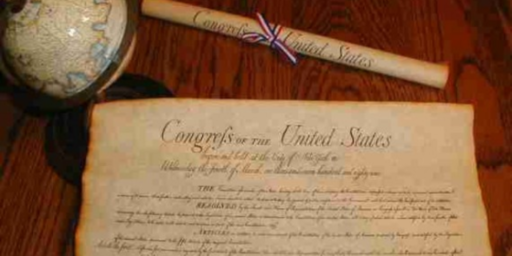ACLU Massive Database Versus NSA Massive Database
Jay Stephenson points out the hypocrisy of the ACLU expressing outrage over the NSA’s database of phone records while they themselves have collected massive amounts of data on their own members, in contravention of their then-existent privacy policy.
It’s an amusing point and related to one that I made this morning in my initial post on the controversy: “Sure, I trust mega-corporations who sell my private information to telemarketers with this information. But a government agency that collects and analyzes signals intelligence? I dunno.”
Indeed, these records already existed, separately, at the phone companies which turned them over to the NSA. Lots of companies and organizations maintain databases on their customers for legitimate operational reasons (as with the phone companies in this case) or by obtaining them from third parties for exploitation. As I implied in the quoted passage above, I have more confidence in the professionalism of the NSA in safeguarding my privacy than I do these companies.
That said, these are entirely different matters legally. While Orin Kerr argues persuasively that no laws were violated (Glenn Greenwald is less sure) and I think the operation makes plenty of sense, potential abuse of power by the state is more problematic than same by private entities simply because of their relative power. That’s why, for example, the government has to prove its burden beyond reasonable doubt in criminal cases but private parties are only held to a preponderance of the evidence standard in civil cases.






Fix that last part. The government can be a plaintiff in a civil case and the burden of proof will remain preponderance. Its the liberty thing that makes criminal cases have a higher standard of proof.
slickdpdx: True, although the reasonable doubt standard obtains even when only a fine is at stake.
Moreover, the relevant legal standard, for instance a search warrant, issues on probable cause which is similar to preponderance. Even more closely supervised intrusive surveillance like wiretaps don’t require proof beyond a reasonable doubt.
Actually although crimes can result in fines imposed, a “crime” that requires proof beyond a reasonable doubt must have the possibility of imprisonment. Contrast with traffic court or zoning violations or whatever where there is no criminal penalties but there are fines.
You need to go read Orin Kerr’s post again. He says that there are no CONSTITUTIONAL problems with this program. But he quite clearly says that the program violates at least three separate statutes.
slickdpdx: Fair enough.
Wilson: He’s saying there are statutes that are possibly applicable but doesn’t cite any illegality by NSA. The only real question is whether the phone companies violated the Stored Communications Act.
The fact that the records were turned over voluntarily by the phone companies would seem to obviate most of the statutory issues he mentions with respect to NSA.
I’m also not sure how the pen register law would be triggered. NSA is not entering people’s homes and implanting a device; it’s just getting records from the phone company.
Orin Kerr actually concedes the program’s illegality when he says the question coincides with the legality or illegality of the earlier NSA program as it relates to the FISA law. Tapping phones without a warrant is a clear violation of FISA as Greenwald makes clear. This stuff is not difficult.
Only politics has so far prevented prosecutions for the violations of the FISA law. Only political blinders, which will be removed the moment a Democrat is in office, has allowed some Repub politicos to pretend they think otherwise.
So your reasoning is that since the phone company actually keeps records of what calls are made (is this a suprise? they have to bill based on something) that turning them over to Bush is cool.
Well after all, Bush said the constitution is just a piece of paper. Sadly, some of his apologists seem to agree.
There are commerical services that will sell you any person’s cell phone records which has worried law enforcement. If those services are legal, why wouldn’t the NSA program be?
Perhaps somebody here can answer this. Now that the government has all this information on our phone patterns, can they simply contact their people and ask for info on such and such a number (say James Joyner’s)and thereby know exactly who he’s talking to, dramatically limiting his, or any other journalists, ability to investigate and report on matters that might not please the then government. Please tell me I’m over-reacting.
cian: Doing that would, clearly, be illegal. Could it happen? Sure. But it could happen in the absence of this program.
“Doing that would, clearly, be illegal.”
What the hell are you talking about? The president has an overriding responsibility to defend the country, and that means from people like you too. I mean, how are they to know, (just guess?) that you are not a terrorist unless they gather a little evidence? Anyway, if they were to do this, y’all would never know about it, unless someone were to break the law and leak it. Lets hope nothing like that ever happens.
Tano, delivering your point by way of sarcasm doesn’t make it any more sensical.
Whether it would be illegal or not is beside the point. Bushco doesn’t care, its illegality won’t stop them, and the Repub Congress will cover for them.